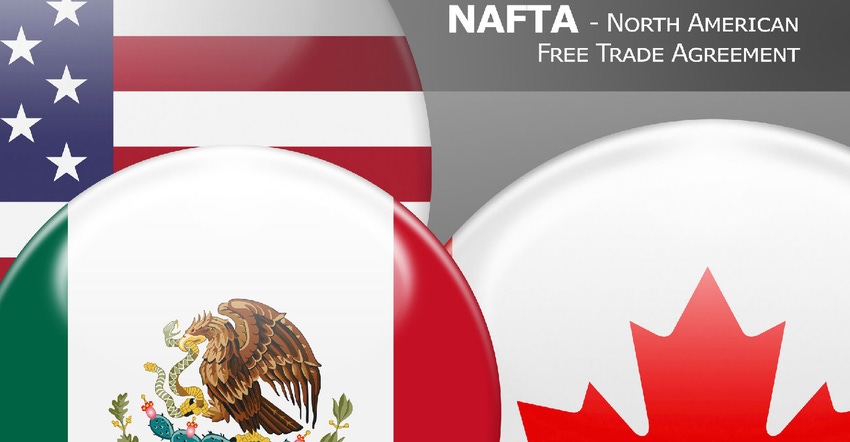Agricultural groups concerned by Trump’s threat to use NAFTA as bargaining chip in who will pay for border wall.

During the week, President Donald Trump took aim at the North American Free Trade Agreement (NAFTA) and specifically said he would use it as a bargaining chip to make Mexico pay for a wall along the border, which he noted he will move forward on building.
“The U.S. has a $60 billion trade deficit with Mexico. It has been a one-sided deal from the beginning of NAFTA, with massive numbers of jobs and companies lost. If Mexico is unwilling to pay for the badly needed wall, then it would be better to cancel the upcoming meeting,” Trump said in a tweet Thursday following reports that Mexico’s president plans to cancel the meeting previously scheduled with Trump next Tuesday.
Altogether, Canada, Mexico and the U.S. make up one of the most competitive and successful regional economic platforms in the world, and agricultural groups are hoping that the new Trump Administration understands the vital role agricultural exports play in offsetting the trade deficit with Canada and Mexico.
A total of 133 organizations and companies from the food and agriculture sector, which supports more than 15 million jobs nationally, sent Trump a letter this week expressing their eagerness to work with his Administration to modernize NAFTA while preserving and expanding the gains achieved to date.
"U.S. food and agricultural exports have produced a trade surplus for nearly 50 years," the letter notes. "Consistent growth over this period resulted in over $130 billion worth of exports, which created $423 billion in U.S. economic activity in 2015." The letter also noted that in the 20 years since NAFTA was implemented, the market integration it fostered helped quadruple the value of U.S. food and agricultural exports to Canada and Mexico.
“With a few key sector exceptions that still require attention, North America intra-regional food and agriculture trade is now free of tariff and quota restrictions," the letter continues.
The National Pork Producers Council (NPPC) noted that U.S. pork exports in 2016 through November totaled nearly $1.2 billion to Mexico, up 21% from the same time last year, and totaled $731 million to Canada, making those countries the number-two and number-four export markets, respectively, for U.S. pork.
Since the U.S., Canada and Mexico instituted their free trade agreement on Jan. 1, 1994, U.S. trade north and south of the borders has more than tripled, growing more rapidly than U.S. trade with the rest of the world. Canada and Mexico are the two largest destinations for U.S. goods and services, accounting for more than one-third of total U.S. exports, adding $80 billion to the U.S. economy and supporting more than 3 million American jobs, according to data from the Office of the U.S. Trade Representative.
In fact, U.S. manufacturing exports to Canada and Mexico have increased nearly 260% over the past 23 years, and U.S. farm exports to the countries have grown by more than 150%.
“Trade in pork with Canada and Mexico has been so successful that any disruption in exports with either partner could hurt our producers’ ability to compete,” said NPPC president John Weber, a pork producer from Dysart, Iowa. “We need to make sure we maintain and even improve our pork exports to our neighbors while working to ensure that others benefit as much as we do.”
NAFTA has brought benefits to the U.S. beef industry, too. For example, U.S. imports of Mexican feeder cattle bring the advantage of less expensive feed grains, economies of scale and proximity to packing plants. On the trade side, U.S. beef exports to Mexico and Canada grew from $656 million in 1994 to more than $1.9 billion in 2015.
In addition, a new fact sheet on NAFTA benefits explained that the U.S.-Mexico portion of NAFTA has been a “resounding success for America’s dairy industry.” The agreement eliminated all dairy tariffs with Mexico and put Mexico head and shoulders above all other U.S. dairy export markets, at more than $1 billion. U.S. dairy exports to Mexico now account for a quarter of total dairy exports and accounted for 3.4% of all U.S. milk production in 2015, which equated to 30,000 American jobs.
National Milk Producers Federation president Jim Mulhern said NAFTA has “opened a major door to Mexico that we don’t want slammed shut.” Mexico is the top market for U.S. dairy exports, totaling $1.2 billion in 2016.
On the crop side, Mexico nearly quadrupled its imports of U.S. soy products since the implementation of NAFTA, reaching $2.44 billion of soy products in 2015.
NAFTA also has substantially expanded the U.S. wheat market in Mexico through the removal of tariffs and state-run procurement and price supports. Wheat exports were 500% higher in the 10 years following NAFTA implementation than in the 10 years preceding it. For the past five years, Mexico has consistently been the second-largest market for U.S. wheat, importing, on average, nearly $1 billion per year. Mexico is not a captive market by proximity, however, and the U.S. share of the wheat market likely will erode without the level playing field created by NAFTA.
About the Author(s)
You May Also Like





